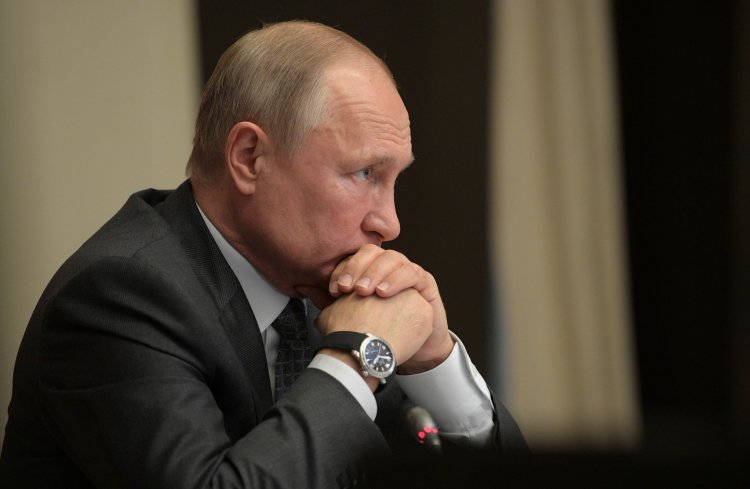January 7, 2020
Russia’s Entrepreneurship Oppression

By Frank Knapp Jr., special to Business 4 Protecting The Election,
Businesses do not usually weigh in on electoral process issues, which makes “Business 4 Protecting The Election” unique.
However, entrepreneurship depends on a real democracy in which people know that if they have a good idea and are willing to sacrifice and work diligently, their idea can be turned into a successful, profitable business for themselves, their families and their communities. Entrepreneurship and a nation’s entire economy suffer when power is removed from the people allowing government and the politically well-connected to control the business ventures of others for their own benefit.
For proof we only need to look at the economy of the nation that interfered with our 2016 U.S. election—Russia.
Russia’s economy is overwhelmingly based on oil and raw materials. Taxes on the export of oil and gas are the principle fuel for the government’s national budget. Because of the lack of diversity in the Russian economy, as oil prices go up and down so does the country’s economy.
In a piece for The National Interest, Russia’s former deputy finance minister Sergey Aleksashenko calls the Russian economy a “primitive structure.”
This characterization is backed up by the facts. While having the largest country in terms of land mass, its economy continues to be on shaky ground. The U.S. annual GDP is nearly 12 ½ times larger than that of Russia. In 2018, our GDP per capita was $62,869 compared to Russia’s $11,289. Even the Texas economy is $400 billion larger than Russia’s.
It’s not that the Russian people are any less interested in being entrepreneurial and have the ability to work hard for the financial security from entrepreneurship. Nor is it that the country itself is incapable of doing better economically.
Michael Rubin of the American Enterprise Institute lays the blame on Russian President Vladimir Putin for the economic morass citing in The National Interest, “the culture of hopelessness that decades of Putinism have wrought upon ordinary Russians.”
When a glimmer of entrepreneurial spirit does rise up in Russia, the state and its well-connected wealthy strike to take the success as their own.
Just last month Andrew Higgins, Moscow Bureau Chief for the New York Times, reported on the most recent glaring examples of this entrepreneurial oppression.
In December of last, year police raided the homes and offices of two founders of a successful Russian technology company which they recently sold to an American business. A criminal case had been filed against their company alleging that the software it sold was really owned by “a Russian internet and media holding company controlled by a state bank and a well-connected billionaire.”
These raids were shortly after another raid on a Moscow import/export small business that also had a criminal case filed against it.
These heavy-handed government actions understandably suppress Russian entrepreneurship.
One popular Russian critic of the government called the raids “the law of the jungle, where the only way to survive is to constantly demonstrate your strength over the weak in the hope that stronger animals will leave you alone.”
The head of a Moscow technology incubator, referring to the software criminal case, said that it “kills technological progress, kills entrepreneurship, kills the already dead venture market and closes the windows to capital for Russian start-ups.”
So why don’t Russians use their vote to change government actions that clearly hold back entrepreneurship that could lift their economy to benefit all?
For the answer one need not look any further than Russia’s use of disinformation to interfere in our 2016 election. Even if election results are not manipulated, an electorate that is fed a steady diet of disinformation through social and traditional media will likely not be casting a well-informed vote, even if it would lead to a better economy.
And in Russia when the people do manage to vote for change, state security forces are used to quell dissent.
Marc Bennetts writes from Moscow for The Guardian about what happened this past September following Putin-supported candidates losing in local elections.
Russian state security services have carried out simultaneous nationwide raids on the Kremlin critic Alexei Navalny’s regional headquarters…The operation, involving more than 1,000 officers in at least 200 individual raids…was carried out across 40 towns and cities the length and breadth of Russia…
Because of its failing economy and other political reasons, Russia needs a United States government that is more of a friend than an enemy.
To this end Russian interference in our elections seeks to create a mirror image of itself in the United States—voter discontent and suppression, power to elected officials not the voters, the diminishing of the rule of law, strongman governance and wealth concentration at the very top.
As we can see in Russia, this scenario leads to the collapse of entrepreneurship.
Securing our elections from Russia or any other foreign or domestic enemy is thus essential not only for protecting our democratic government of and by the people, but also for preserving our nation’s highly successful entrepreneurial economy.
Mr. Knapp is the president/CEO of the South Carolina Small Business Chamber of Commerce.
This forum is for entrepreneurs and business organizations to voice their concerns about foreign and domestic interference in our nation’s elections. We welcome submissions that make the business case for protecting our elections. Please send your 600-800 word opinion pieces to protectelection@gmail.com.